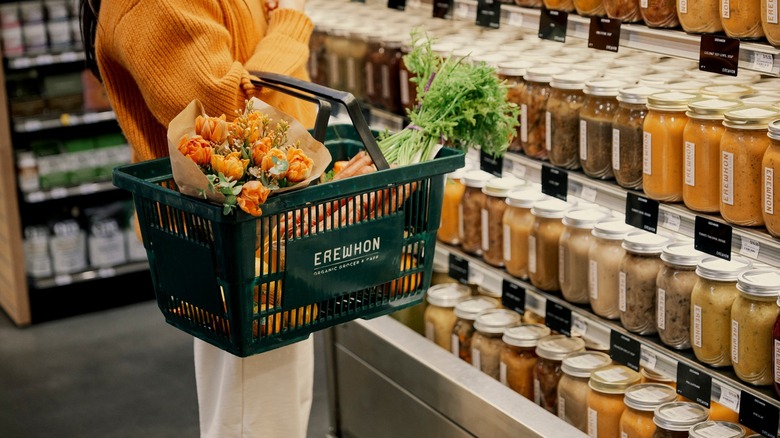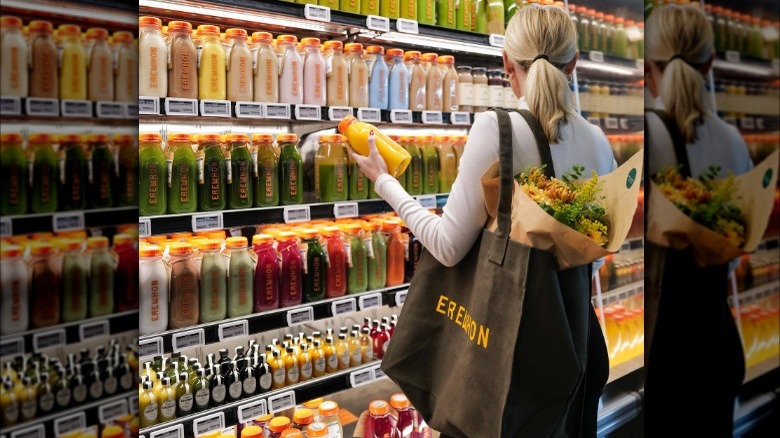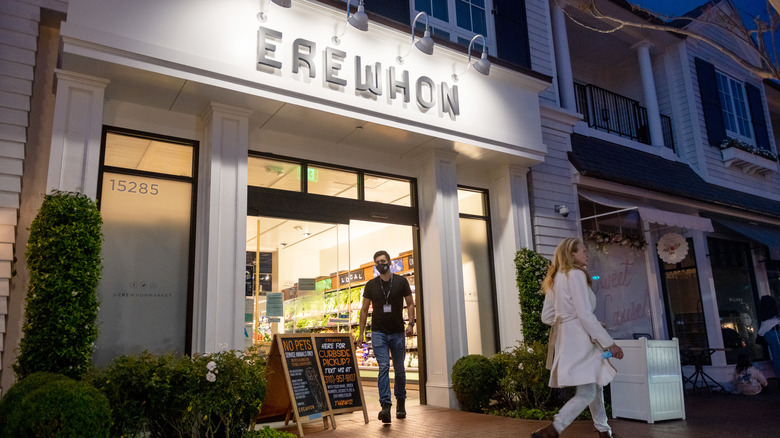Erewhon Isn't A Grocery Store, It's Everything That's Bad About LA
It feels like a hacky joke to say a Los Angeles grocery store got a writeup in Vogue, but few cities embrace their own stereotypes quite like LA, and few places embody the city's massive wealth and celebrity food culture like Erewhon. The trendy food destination was born as a health-focused, organic grocery during the 1960s, but Erewhon's current form only took shape during the last decade. Since new ownership took over in 2011, the grocer has expanded across the wealthiest LA enclaves, transforming from granola to glam and cultivating a fandom that includes big-name actors and influencers.
This would all be pretty standard fare, as rich people like nice, expensive things, but the sheer excess of Erewhon can be shocking. Even as someone who has become desensitized to outrageous Los Angeles prices, I can hardly believe my eyes when I peruse the aisles of my neighborhood location. Basic, prepackaged food like roasted cauliflower can easily run $20 a pound, and you're more likely to find $50 cuts of wagyu beef than you are an affordable jar of peanut butter.
But perhaps the worst part of Erewhon's rise in popularity is the fact that this is happening against the backdrop of a city very publicly struggling with a skyrocketing cost of living crisis that has pushed thousands of people onto the streets or out of the state entirely. Meanwhile, Erewhon — an image-obsessed spot selling one of the essentials of life at prices completely out of reach for 95% of Los Angeles — has come to symbolize the city in the worst possible way.
Erewhon is clean eating for the social media age
The first thing I notice every time I go to Erewhon is that it's beautiful. The store is stocked to the brim with colorful, picture-perfect organic products neatly organized. There are lines of $14 juices in glass jars and probiotic sodas that appeal to graphic designers as much as grocery shoppers. The fresh produce is vibrant, overflowing with its organic bounty; it looks like it has never been touched before. It's almost enough to distract from the fact you're paying $3 more for the same organic Driscoll's berries sold at a "normal" grocery store or that a single red pepper is $7.
The reason the grocery section looks untouched isn't just because the cheapest jar of pasta sauce is $11, it's because buying ingredients to cook isn't the point of Erewhon. Like everyone else, when I'm shopping at the store, I'm there for the prepared foods. At Erewhon, the people examining wraps and pastries will outnumber those in the grocery section 30 to one. Now, to be fair, the food from the prepared section is good, but the prices are just as gasp-inducing: $10 lattes, $13 tuna rolls, and premade sandwiches with two slices of meat on white bread for close to $20. The food might be organic, but it's unclear why it costs so much, except that Erewhon caters to wealthy clientele capable of paying any price for the image of health.
Erewhon embodies a world where health is a luxury good
With its image of beautiful people picking at lightly seasoned vegetables that cost more than your entire grocery bill, Erewhon presents an exclusionary vision of healthy eating. It's a store for people who have the means to focus their entire life on pursuing the Instagram-ideal of self-care. People for whom eating is an act of public branding and who often think anything affordable must be disgusting. Erewhon sells the world the idea that the way to health is through excessive conspicuous consumption in a city where runaway prices are actually destroying people's lives.
You do not need to eat at places like Erewhon to be healthy. There are thousands of neighborhood restaurants in Los Angeles where you can find food that is just as nutritious at half the price. Just down the street from my local Erewhon I can grab a plate of juicy, roasted chicken with rice and beans for under $15; there are vegan restaurants with salads that are made fresh to order, twice the size, and somehow cheaper than the grocery chain's boxed options. But Erewhon wants you to think that prettier and more expensive means better because otherwise, you might realize you're paying for nothing but clout.
When it comes down to it, Erewhon is another image-based cash grab that preys off the insecurities of those who think the rich must know better, and in doing so it's just another part of the exclusionary ideal that is pushing so many people in Los Angeles to the margins.


